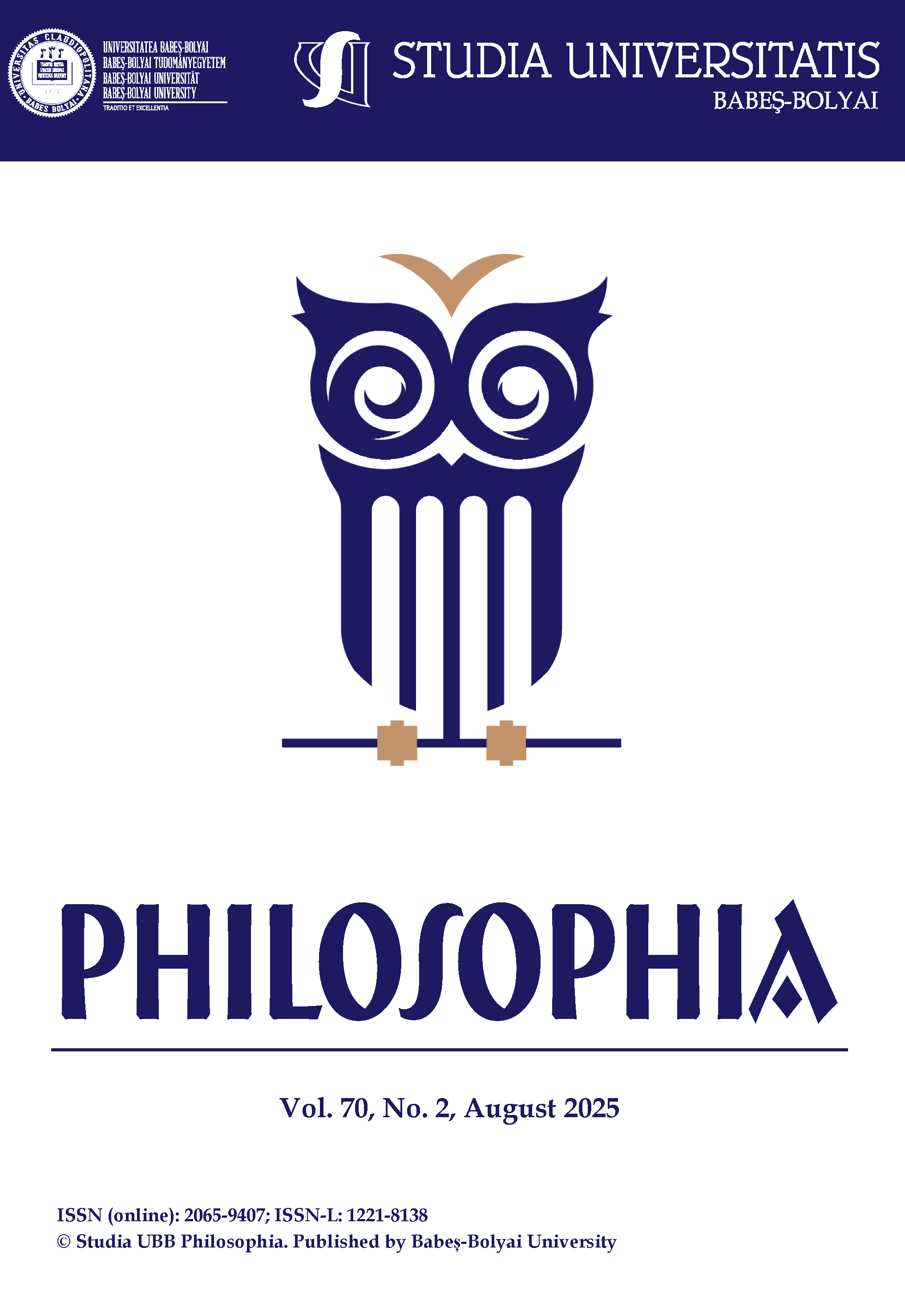Counterfactuals, Modal Knowledge, and Understanding
DOI:
https://doi.org/10.24193/subbphil.2025.2.03Keywords:
modal epistemology, realism, metaphysical modality, philosophy of language, understanding, counterfactualsAbstract
In this essay, I attempt to diagnose and show the importance of a structural problem that affects Williamson’s counterfactual epistemology of modality. First, I provide a general, even if somewhat heuristical, description of the requirements that a realist epistemology of modality must fulfil. The requirements are analyzed and used for interpreting various controversial choices that Williamson and other philosophers make when theorizing modal knowledge. I then proceed to explain why a more thorough examination of the integration of Williamson’s view of understanding and of his restrictive epistemology of modality leads to the uncovering of a tension that jeopardizes Williamson’s robust realist tenets. I argue that a similar problem (or perhaps different problems with similar underlying reasons) befalls other realist accounts and show why various extant solutions are insufficient. The paper concludes with a reappraisal of the tasks that modal epistemologists have hitherto ignored or treated only collaterally, which may also be interpreted as a critical analysis of the limits of older and newer conceptions of metaphysical modality.
References
Paul Boghossian. 2011. “Williamson on the a priori and the analytic.” Philosophy and Phenomenological Research 82 (2): 488–497. DOI: 10.1111/j.1933-1592.2010.00395.x.
Duen-Min Deng. 2016. “On the Alleged Knowledge of Metaphysical Modality.” Philosophia 44 (2): 479-495. DOI: 10.1007/s11406-016-9699-6.
Alexandru Dragomir. 2021. "Intellectual Virtues and The Epistemology of Modality: Tracking the Relevance of Intellectual Character Traits in Modal Epistemology." Annals of the University of Bucharest – Philosophy Series 70 (2): 124-143.
Frank Jackson. 2010. Language, Names, and Information. Oxford: Wiley-Blackwell.
Carrie S. Jenkins. 2008. “Modal Knowledge, Counterfactual Knowledge and the Role of Experience”. Philosophical Quarterly 58 (233): 693–701. DOI: 10.1111/j.1467-9213.2008.579.x.
Immanuel Kant. [1783] 2004. Prolegomena to Any Future Metaphysics That Will Be Able to Come Forward as Science (with Selections from the Critique of Pure Reason). Translated and edited by Gary Hatfield. Revised edition. Cambridge University Press.
Daniel Kilov & Caroline Hendy. 2022. “Pundits and Possibilities: Philosophers Are Not Modal Experts.” Australasian Journal of Philosophy 75 (1): 824-843. DOI: 10.1080/00048402.2022.2058034
Boris Kment. 2014. Modality and Explanatory Reasoning. Oxford: Oxford University Press.
Saul A. Kripke. 1971. “Identity and necessity.” In Identity and Individuation, edited by Milton Karl Munitz, 135-164. New York: New York University Press.
Saul A. Kripke. 1980. Naming and Necessity. Cambridge, MA: Harvard University Press.
Peter Kung. 2016. “You Really Do Imagine It: Against Error Theories of Imagination.” Noûs 50 (1): 90-120. DOI: 10.1111/nous.12060.
Edouard Machery, Ron Mallon, Shaun Nichols and Stephen Stich. 2004. “Semantics, Cross-Cultural Style.” Cognition 92 (3): B1-B12. DOI: 10.1016/j.cognition.2003.10.003.
Genoveva Martí. 2009. “Against Semantic Multi-culturalism.” Analysis 69 (1): 42-48. DOI: 10.1093/analys/ann007.
Stephen McLeod. 2005. “Modal Epistemology.” Philosophical Books 46 (3): 235-245. DOI: 10.1111/j.1468-0149.2005.00371.x.
Christopher Peacocke. 1999. Being Known. Oxford: Clarendon.
Hilary Putnam. 1975. “The meaning of ‘meaning.’” Minnesota Studies in the Philosophy of Science 7: 131-193.
Sonia Roca-Royes. 2010. “Modal Epistemology, Modal Concepts and the Integration Challenge.” Dialectica 64 (3): 335-361. DOI: 10.1111/j.1746-8361.2010.01236.x.
Sonia Roca-Royes. 2011. “Modal Knowledge and Counterfactual Knowledge.” Logique et Analyse 54 (216): 537-552.
Mihai Rusu. 2011. “Essentialism, reference and the necessary a posteriori.” Filosofia Unisinos 12 (3): 197-218. DOI: 10.4013/fsu.2011.123.01.
Tuomas E. Tahko. 2012. “Counterfactuals and modal epistemology.” Grazer Philosophische Studien 86 (1): 93–115. DOI: 10.1163/9789401209182_007.
Anand Jayprakash Vaidya & Michael Wallner. 2021. “The epistemology of modality and the problem of modal epistemic friction.” Synthese 198 (Suppl 8): 1909-1935. DOI: 10.1007/s11229-018-1860-2.
Peter Van Inwagen. 1998. “Modal epistemology.” Philosophical Studies 92 (1): 67-84. DOI: 10.1023/A:1017159501073.
Timothy Williamson. 2007. The Philosophy of Philosophy. Oxford: Wiley-Blackwell.
Timothy Williamson. 2011. “Reply to Boghossian.” Philosophy and Phenomenological Research 82(2): 498–506. DOI: 10.1111/j.1933-1592.2010.00400.x.
Crispin Wright. 2002. “On Knowing What is Necessary: Three Limitations of Peacocke’s Account.” Philosophy and Phenomenological Research 64 (3): 655-662. DOI: 10.1111/j.1933-1592.2002.tb00170.x.
Stephen Yablo. 1993. “Is conceivability a guide to possibility?” Philosophy and Phenomenological Research 53 (1): 1-42. DOI: 10.2307/2108052.
Downloads
Published
How to Cite
Issue
Section
License
Copyright (c) 2025 Studia Universitatis Babeș-Bolyai Philosophia

This work is licensed under a Creative Commons Attribution-NonCommercial-NoDerivatives 4.0 International License.



